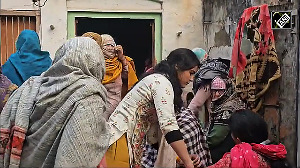In a move that is bound to spell relief for social media users, the government on Tuesday launched the much-awaited grievance appellate committee (GAC) mechanism that will allow users to appeal against decisions of social media platforms by filing their complaints on a new portal.

The GAC, in effect, is an online dispute resolution mechanism, and users aggrieved by a decision of the grievance officer of an intermediary, say Meta or Twitter, can file their appeal or complaint through the new portal -- https://gac.gov.in.
Minister of State for IT Rajeev Chandrasekhar launched the new platform and described the GAC mechanism as another key milestone in the evolving framework that ensures that the internet is open, safe, trusted and accountable to users.
"GAC is an institution whose main aim is to ensure that grievance redressal mechanisms of platforms are functional, responsive to people, and as an exception when that function is unable to resolve a grievance, the appeals will come to GAC," Chandrasekhar told reporters.
The move assumes significance as user discontent had been brewing over alleged arbitrary acts of social media platforms on flagged content, or intermediaries not responding fast enough to the grievances.
The latest move will arm the users with an effective mechanism in the form of appellate panels that will look into complaints filed by individuals against the decisions of grievance officers of social media platforms.
Put simply, GAC deals with the appeals of users aggrieved by decisions of grievance officers of social media intermediaries.
Any user aggrieved by a decision of a platform's grievance officer can appeal to the grievance appellate panel within 30 days of the receipt of communication from the grievance officer.
The Centre last month notified three grievance appellate committees, terming the mechanism a critical piece of overall policy and legal framework to ensure that Internet in India is open, safe and trusted. The three grievance appellate committees have three members each.
"GAC squarely takes on the issue of accountability of platforms towards digital nagriks. As important as ensuring that the internet is safe and trusted, is our objective that the internet and the platforms have an institutional mechanism of being accountable to crores of digital nagriks," Chandrasekhar explained.
The panels and, indeed the mechanism, will encourage platforms and digital intermediaries "to do their job well".
"As an exception when the intermediaries are unable to resolve a dispute, the GAC steps in, and then of course if they are still unable to resolve that to the satisfaction of both players, then the court system will take care of that dispute," Chandrasekhar said.
GAC will act as a tool to empower digital users and will ensure full accountability of platforms to them.
"This is a classic example of the ease of living using technology and I am glad that the Ministry is able to launch it on a day that the PM spoke on this theme (earlier today)," Chandrasekhar said.
The GAC is an extension of the government's vision of creating more and easier ways of resolving disputes, the minister said.
The platform will continue to evolve and more functionalities will be built into it over time, the minister promised.
"There will be more functionality built into the platform, including Artificial Intelligence and learning models that will allow this to be more automatic. Hence redressal of the grievances will be more expeditious and quicker, as this platform gets more and more sophisticated," he said.
GAC is an important part of the overall framework being built, he said and hoped that the new mechanism will, in fact, encourage platforms to resolve grievances at their end.
"The GAC platform will address grievances that spill out and remain unresolved," the minister pointed out.
Complaints and appeals, in case they come to GAC in large numbers, will show that perhaps some problem exists with the grievance redressal method adopted by the platforms.
Asked if organisations will be allowed to file complaints on behalf of individuals, the minister said GAC's access could be extended to CSC (common service centres) so some kind of assistance could be given to an appellant in filing of the appeal.
The CSC will be involved in proliferation of the GAC and the awareness around it. "But we don't consider it appropriate right now to permit proxy to file appeals," he said.
All orders of the GACs will be uploaded, the minister said, assuring that the process will be kept transparent.
"We are creating an institution that will be a beacon on the Indian internet," he said.
The new portal lists out detailed FAQs for the convenience of users. The appellants can track the status of their appeal through the appellant login window.
"GAC will upload its order on https://gac.gov.in, and the appellant will receive notification of the same by SMS and email," as per the FAQ.
The government had earlier said the move to create the grievance appellate committee mechanism was necessitated due to the "casual" and "tokenism" approach of digital platforms towards user complaints.
Broadly, these appeals could be around complaints regarding sexually explicit content, misinformation, or religious incitement.
The government has, in the new rules, added objectionable religious content (with intent to incite violence) alongside pornography, trademark infringements, fake information and something that could be a threat to sovereignty of the nation, as content that users can flag to social media platforms.
Social media platforms' decisions on such complaints can now be challenged in the grievance committees.
Notably, the newly-amended IT rules also impose a legal obligation on social media companies to take all out efforts to prevent barred content and misinformation.











 © 2025
© 2025